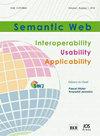TermitUp: Generation and enrichment of linked terminologies
IF 2.9
3区 计算机科学
Q2 COMPUTER SCIENCE, ARTIFICIAL INTELLIGENCE
引用次数: 3
Abstract
Domain-specific terminologies play a central role in many language technology solutions. Substantial manual effort is still involved in the creation of such resources, and many of them are published in proprietary formats that cannot be easily reused in other applications. Automatic term extraction tools help alleviate this cumbersome task. However, their results are usually in the form of plain lists of terms or as unstructured data with limited linguistic information. Initiatives such as the Linguistic Linked Open Data cloud (LLOD) foster the publication of language resources in open structured formats, specifically RDF, and their linking to other resources on the Web of Data. In order to leverage the wealth of linguistic data in the LLOD and speed up the creation of linked terminological resources, we propose TermitUp, a service that generates enriched domain specific terminologies directly from corpora, and publishes them in open and structured formats. TermitUp is composed of five modules performing terminology extraction, terminology post-processing, terminology enrichment, term relation validation and RDF publication. As part of the pipeline implemented by this service, existing resources in the LLOD are linked with the resulting terminologies, contributing in this way to the population of the LLOD cloud. TermitUp has been used in the framework of European projects tackling different fields, such as the legal domain, with promising results. Different alternatives on how to model enriched terminologies are considered and good practices illustrated with examples are proposed.TermitUp:生成和丰富链接的术语
特定于领域的术语在许多语言技术解决方案中发挥着核心作用。这些资源的创建仍然需要大量的手工工作,而且其中许多都是以专有格式发布的,在其他应用程序中不容易重用。自动术语提取工具有助于减轻这项繁琐的任务。然而,它们的结果通常是纯术语列表的形式,或者是具有有限语言信息的非结构化数据。诸如语言链接开放数据云(LLOD)之类的计划促进了以开放结构化格式(特别是RDF)发布语言资源,并将它们链接到数据网上的其他资源。为了充分利用LLOD中丰富的语言数据并加快相关术语资源的创建,我们提出了TermitUp服务,该服务直接从语料库中生成丰富的领域特定术语,并以开放和结构化的格式发布它们。TermitUp由术语提取、术语后处理、术语充实、术语关系验证和RDF发布五个模块组成。作为该服务实现的管道的一部分,LLOD中的现有资源与生成的术语相关联,以这种方式为LLOD云的填充做出贡献。TermitUp已被用于处理不同领域(如法律领域)的欧洲项目框架中,并取得了可喜的成果。考虑了如何对丰富的术语建模的不同选择,并提出了用实例说明的良好实践。
本文章由计算机程序翻译,如有差异,请以英文原文为准。
求助全文
约1分钟内获得全文
求助全文
来源期刊

Semantic Web
COMPUTER SCIENCE, ARTIFICIAL INTELLIGENCEC-COMPUTER SCIENCE, INFORMATION SYSTEMS
CiteScore
8.30
自引率
6.70%
发文量
68
期刊介绍:
The journal Semantic Web – Interoperability, Usability, Applicability brings together researchers from various fields which share the vision and need for more effective and meaningful ways to share information across agents and services on the future internet and elsewhere. As such, Semantic Web technologies shall support the seamless integration of data, on-the-fly composition and interoperation of Web services, as well as more intuitive search engines. The semantics – or meaning – of information, however, cannot be defined without a context, which makes personalization, trust, and provenance core topics for Semantic Web research. New retrieval paradigms, user interfaces, and visualization techniques have to unleash the power of the Semantic Web and at the same time hide its complexity from the user. Based on this vision, the journal welcomes contributions ranging from theoretical and foundational research over methods and tools to descriptions of concrete ontologies and applications in all areas. We especially welcome papers which add a social, spatial, and temporal dimension to Semantic Web research, as well as application-oriented papers making use of formal semantics.
 求助内容:
求助内容: 应助结果提醒方式:
应助结果提醒方式:


